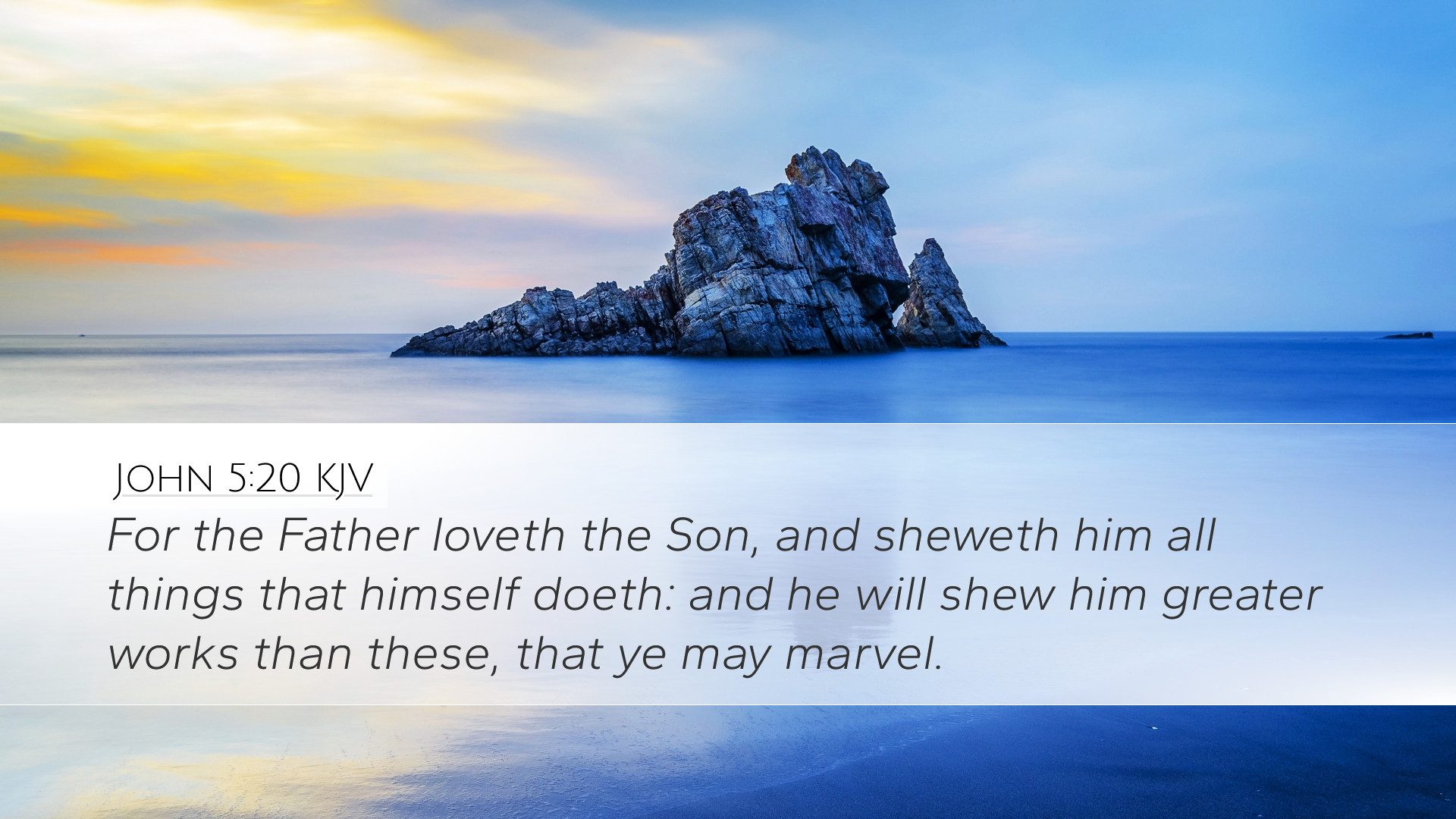Commentary on John 5:20
John 5:20 states: "For the Father loves the Son, and shows him all things that He Himself does; and He will show Him greater works than these, that you may marvel." This verse is rich in theological significance and provides insight into the relationship between the Father and the Son, as well as the scope of Jesus’ ministry and the nature of His miraculous works.
Contextual Analysis
The context of this verse lies within Jesus’ discourse following His miraculous healing of the man at the pool of Bethesda. It is important for readers to understand the interaction that leads to this proclamation. Jesus claims a unique relationship with God the Father, which further intensifies the conflict with the Jewish authorities who view His actions and claims as blasphemous.
The Love of the Father for the Son
Matthew Henry comments on the significance of the phrase "the Father loves the Son". This love is foundational to the divine relationship, emphasizing not just affection but an approval and shared purpose. This love is a powerful motivator for the works that Jesus performs, reflecting the unity of their intentions in creation and redemption.
Revelation of Divine Works
Albert Barnes emphasizes that "shows him all things that He Himself does" suggests a continuous and intimate communication between the Father and the Son. Jesus, as the Son, has full insight into the divine plans and purposes of the Father. This highlights the Trinitarian relationship wherein the Son acts in perfect harmony with the Father. Such revelation includes not only knowledge but also empowerment to perform miraculous deeds.
Greater Works to Come
When Jesus states, "He will show Him greater works than these," He is foreshadowing the greater manifestations of His power and glory, especially as His ultimate purpose is fulfilled through His death and resurrection. Adam Clarke interprets this as an indication of the miraculous acts that would follow, especially through the apostles and the emergence of the early church. The greater works refer more to spiritual breakthroughs rather than mere physical miracles, indicating the transformative nature of the Gospel.
The Purpose of the Miracles
Jesus concludes with the phrase "that you may marvel", which is pivotal. The purpose of these works is directed towards eliciting genuine wonder and belief in the observers. Henry notes that the miracles are signs meant to lead the onlookers to faith in Jesus as the Messiah and the Son of God, emphasizing the dual purpose of demonstrating divine power while inviting faith and reverence from humanity.
Theological Implications
- Trinitarian Relationships: The expression of love between the Father and the Son underlines the doctrine of the Trinity, signaling intricate unity and cooperative action within the Godhead.
- Divine Authority: The Father’s revelation to the Son establishes Jesus’ authority to act. As His representative on earth, this authority validates His claims and deeds.
- Nature of Miracles: The mention of greater works challenges readers to understand the purpose of Jesus' miracles beyond mere physical restoration; they are signs pointing to spiritual realities.
- Invitation to Belief: The aim of miracles is not for sensationalism but is a divine strategy to engage hearts and minds towards faith in Christ.
Conclusion
John 5:20 serves as a theological cornerstone within the Gospel of John, shedding light on the interplay of divine love, revelation of God’s works, and the purpose behind the miracles of Jesus. For pastors, students, theologians, and scholars, this verse invites deeper reflection on Jesus’ identity and mission as well as the broader call to marvel at and respond to the works of God in Christ.


